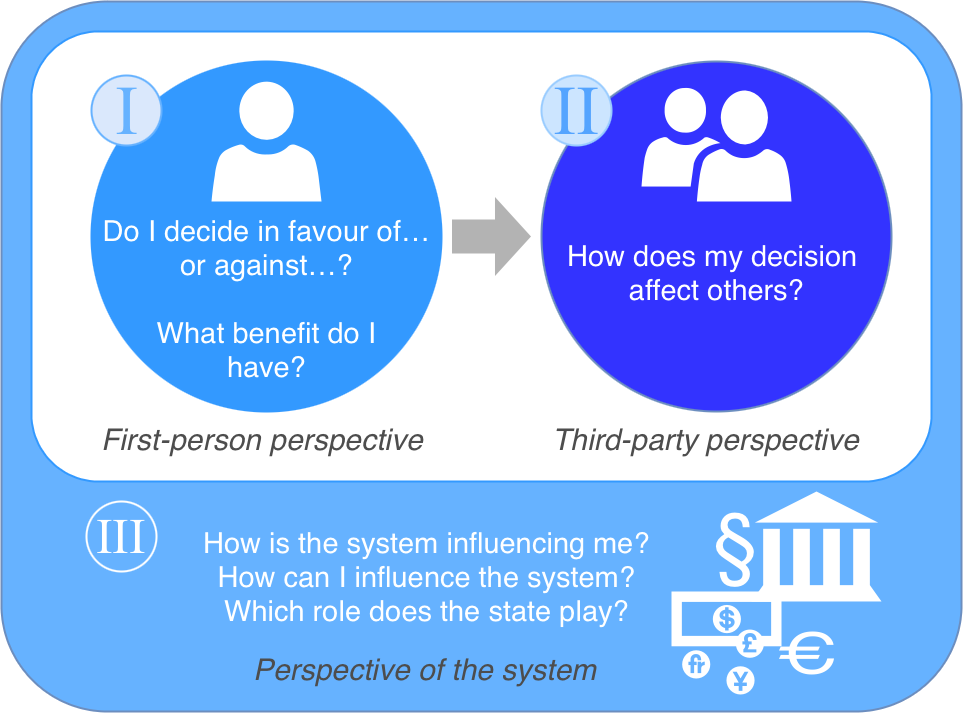

Shift in perspective?
We can take three different points of view to look at our political & economic interests
- First-person perspective: That is your personal perspective. Are you going to buy a new smartphone? Do you really need a fifth pair of sneakers?
- Third-party perspective: Who will win the raw materials for your smartphone and under what conditions are the raw materials mined?
- Perspective of the system: Who guarantees that there are no bad health effects from your sneakers/mobile? How can I influence the system for better working conditions?


What is...?
I. First-perspective
- How important is it for me?
- Does it concern me?
- What are my feelings with it?
II. Third-party perspective
- What actors/instutions are involved?
- Whose interests are represented?
- What is the balance of power?
III. Perspective of the system
- What is the balance of power?
- What is the problem/controversy?
- How did it come to status quo?
What is possible?
I. First-person perspective
- What are my ideas/wishes?
- Is it of any necessity to me?
- What are my personal goals?
- What needs to be done to solve the problem?
II. Third-party perspective
- Is there any agreement or disagreement?
- How can we find / come to a compromise?
- How can I improve / change the situation for me and for other actors?
- Are there possible solutions?
- Are there possible consequences?
- What interdependence(s) does our action have?
- What are the chances / risks / dangers?
III. Perspective of the system
- What can change / improve status quo?
- What are possible consequences of action / not taking action?
- What does a possible systemic solution look like?
- What are the chances / risks / dangers?
What shall be?
I. First-perspective
- What is the benefit for me?
- Are my ethical limits observed?
- What do I want to do to change the situation?
- Which solutions, agreements, compromises can I find / agree on?
II. Third-party perspective
- How can we solve the problem?
- How can we establish a balance of power?
- What law or law changes are applicable to find a solution for others?
- What solution / compromise / agreement can be made possible?
III. Perspective of the system
- Shall there be a division of power?
- How is law enforcement build up?
- How shall the system be build up / changed / altered to solve the problem?
- How shall scarce resources be distributed?
- What shall a balance between freedom and safety / security look like?
- How can negative externalities be avoided if appearing?

Justice?
Does the decision / proposal meet…
- efficiency fairness? (Leistungsgerechtigkeit)
Are the wages performance based? Is individual performance observed/considered/taken into account of? - needs-based fairness?
(Bedarfsgerechtigkeit) Are the needs in line with / meet the demands of the actors? - principal of equality?
(Chancengengerechtigkeit)
Do all actors have the same chances/treated equally? - generation fairness?
(Generationengerechtigkeit)
Are the needs and interests of future generations considered?
Sustainability?
- Does it offer a permanent solution?
- Does the decision / the proposal / demand guarantee…
- ecological sustainability?
- economical sustainability?
- social sustainability?
- Does it establish democratic order?
- Does it establish politically sustainable development?
Efficiency?
- Can the aim be reached using less ambitious means / lower requirements?
- Does reaching the aim justify the applied means / the effort made use of?
Representation?
Are the interests (positions) of social groups adequately represented?
Safety/Security?
Does the decision / proposal / demand guarantee the
-
- inner
- outer
… security?
Participation?
Are there similar chances of social groups for participating adequately in political decision-making process?
Effectivity?
Is the solution of the problem suitable to reach the targeted aim?
There may also be criteria like fairness or sustainability included/intended.
Subsidiarity?
Are the decisions taken solved on the lowest possible level?
Human dignity?
In how far are human dignity and human rights considered?
Personal freedom?
- Is the sphere of personal privacy protected?
- Are a free decision making chance, the religious respect, the ideological idea of freedom, free communication, free economic range of action guaranteed?
Legitimacy?
- Is the decision / action legitimate and justifiable?
- (Includes criteria such as Human Dignity, Freedom, Participation, Solidarity, Fairness, Transparency and others)
Equality?
Is everyone treated equally?
Legality?
- Do the procedures of the decision making process and the decisions finally made correspond/match with/meet the legal basis for applied legislation?
- Basic Rights/fundamental rights?
Transparency
- Is it a public decision-making process?
- Is the influence taken by different interest groups open to the public?
Private and Public
- What life areas shall be regulated by the state and which not?
- What forms of private coexistence are being promoted / favoured?
- What is the difference between acting in a private sphere in comparison to the public sphere?
- How can privacy be protected in present times of digitisation?
- Which role do the media have in public discourse?
Power and Decision Making
- Which authority does decide in which (official) channels?
- Who can decide and which legitimation does he/she have to do so?
- What possibility do the citizens have to influence the decision-making process?
Scarcity and Distribution
- How shall the use of scarce resources be organised and how shall it be implemented?
- In a world of scarce resources: How can we distribute the resources in a fair/just/efficient way?

Interests and Common Good
- What is ‚good’ politics?
- What values are important/necessary in our society?
- What is ‚public good’ in the first place and how can it be measured?
- Which role do democratic dispute resolutions play in society?
Policy, Rules and Law
- Which policies / regulations / directives / recommendations give ruling on the political or economical scope of action?
- How are violations detected and societal problems solved?
- How do policies / regulations / directives / recommendations influence behaviour?
Order and Structure
- How can a political system be structured? Which structural principles are important?
- Polity: Which interdependencies are there between the institutions?
- Which economic order/system is most efficient to solve the problem?


